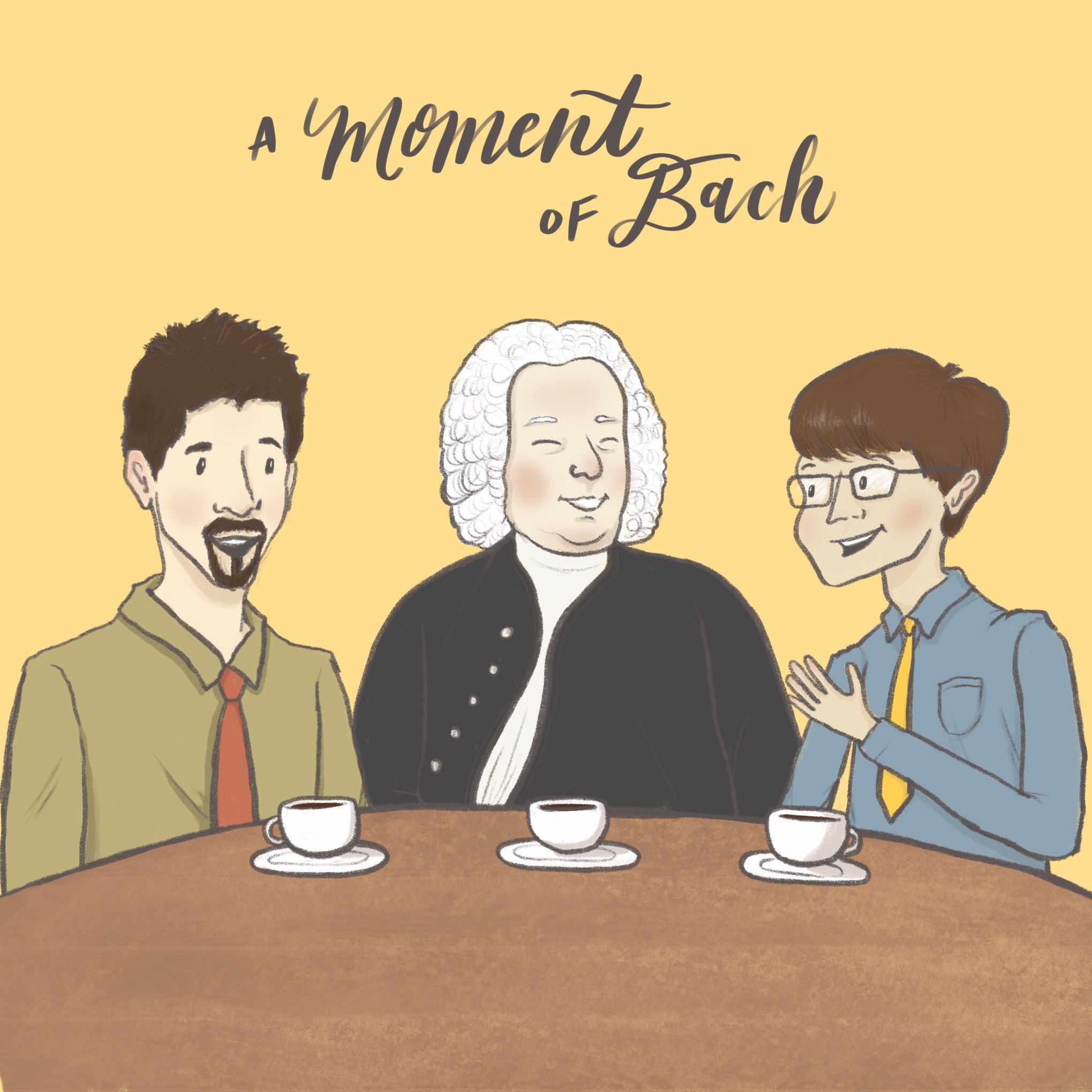
253.2K
Downloads
176
Episodes
Welcome to A Moment of Bach, where we take our favorite moments from J. S Bach's vast output—just a minute's worth or even a few seconds—and show you why we think they are remarkable. Join hosts Alex Guebert and Christian Guebert for weekly moments! Check wherever podcasts are available and subscribe for upcoming episodes. Our recording samples are provided by the Netherlands Bach Society. Their monumental All of Bach project (to perform and record all of the works of J. S. Bach) serves as source material for our episodes. https://www.bachvereniging.nl/en https://www.bachvereniging.nl/en/allofbach Artwork by Sydney LaCom
Welcome to A Moment of Bach, where we take our favorite moments from J. S Bach's vast output—just a minute's worth or even a few seconds—and show you why we think they are remarkable. Join hosts Alex Guebert and Christian Guebert for weekly moments! Check wherever podcasts are available and subscribe for upcoming episodes. Our recording samples are provided by the Netherlands Bach Society. Their monumental All of Bach project (to perform and record all of the works of J. S. Bach) serves as source material for our episodes. https://www.bachvereniging.nl/en https://www.bachvereniging.nl/en/allofbach Artwork by Sydney LaCom
Episodes

Monday Jul 28, 2025
Schauet doch und sehet (BWV 46): opening chorus
Monday Jul 28, 2025
Monday Jul 28, 2025
When assembling his Mass in B minor, Bach drew from many of his older works. Here is one great example. If you, like us, have always been mesmerized by the haunting sound of the "Qui tollis" movement from the Mass in B minor, you absolutely must hear the opening chorus to the cantata Schauet doch und sehet, which is the full version of the material, and which concludes in a twirling, twisting fugue.
See the performance of Schauet doch und sehet (BWV 46) by the Netherlands Bach Society, conducted here by Hans-Christoph Rademann
Compare with the "Qui tollis" movement of the Mass in B minor, Netherlands Bach Society, led by Jos van Veldhoven

Monday Jul 21, 2025
Ein feste Burg ist unser Gott (BWV 80): bass/soprano duet
Monday Jul 21, 2025
Monday Jul 21, 2025
We return to the Mighty Fortress cantata to do a deeper analysis on the theological counterpoint of this movement. Bach combines two vocal parts -- one is Luther's hymn and the other is new poetry with Bach's own music -- and weaves both of those into a tapestry of staccato strings and marching bass. Bach's theological profundity is what separates him from the other composers; when Bach weaves two separate texts together, he adds meaning to both by connecting their core essences together.

Wednesday Jul 16, 2025
Brandenburg Concerto No. 1: Polonaise
Wednesday Jul 16, 2025
Wednesday Jul 16, 2025
What good is a centerpiece but to add to the pomp and pride and beauty of a ceremonial occasion? The Polonaise is historically such a centerpiece for such an elegant, lavish affair. Chopin is the natural figure for the Polonaise, a stately dance for pairs, but it was known much earlier to the Baroque composers. Bach was no stranger to Polish style, as shown in this centerpiece Polonaise to the Menuet of the Brandenburg Concerto No. 1.
When Bender the robot was driftless in space with his candelabra, he realized it belonged on a piano centerpiece. It was a shame that he couldn't manage to get his Chopin working before he got too frustrated.
Polonaise from the Menuet of Brandenburg Concerto No. 1

Monday Jul 07, 2025
Brandenburg Concerto No. 1: Trios I and II
Monday Jul 07, 2025
Monday Jul 07, 2025
Oboe talk today!
Mastering this instrument is almost unreasonably challenging, but the juice is worth the squeeze -- the baroque oboe, when played truly well, is one of the most rewardingly beautiful instruments.
Musical examples, as always, are courtesy of the Netherlands Bach Society. Check out their "All of Bach" project.
Referenced in today's episode:
Brandenburg Concerto No. 1: Trio I (2 oboes and bassoon) - performance by Netherlands Bach Society
Short documentary video on the baroque oboe, featuring NBS oboist Katharina Verhaar
Another cantata we referenced today: Vergnügte Ruh (BWV 170)
Scott Leger horn - youtube short - excerpt from Brandenburg 1 trio II

Monday Jun 30, 2025
Brandenburg Concerto No. 1: Menuet
Monday Jun 30, 2025
Monday Jun 30, 2025
The three instrument families in this big baroque orchestra leads us to speculate that Bach represented three social classes: the royal elite (elegant strings, one leader), the aristocratic nobles (horns, for upper-class hunting expeditions), and the common people (reeds, as for outdoor bands or shepherding). Bach concludes the concerto with the elegant and grand menuet (note his spelling; not "minuet"). The French dance exudes class and status, though in this case, the hunters and even the common townsfolk are invited to participate in the great dance of strings, reeds, and horns.
In this episode we discuss the repeating refrain section, called the "menuet" section. There are three other parts of the complete structure to be discussed in our next two episodes.
Audio note: at 20:55-21:15, we recommend stereo listening, so that you can hear the two pitches/beats separated to the left (bottom pitch; slower beating) and right (higher pitch by perfect fifth interval; faster beating). The respective ratio is 2:3. As it gets slower, listen for two clicks on the left for every three on the right.

Monday Jun 23, 2025
Brandenburg Concerto No. 1: movement 3
Monday Jun 23, 2025
Monday Jun 23, 2025
The "rule of three" is in full effect here, as Bach carries us along with this jaunty dance, rhythmic triplets and triple sets of musical sentences abounding with life and energy. This eloquent piece can be considered a precursor to the later "sonata form" of the Classical period, along with Bach's other Brandenburg concertos.
Performance of movement 3 of Brandenburg 1 by the Netherlands Bach Society

Monday Jun 16, 2025
Brandenburg Concerto No. 1: movement 2
Monday Jun 16, 2025
Monday Jun 16, 2025
A far far cry from the happy hunting horns of the first part, the second part of Brandenburg Concerto No. 1 is a bitter adagio. To modern ears, its aesthetic of dark gangster drama is less galant, and more "Godfather."
(Look at our past seasons to find episodes covering Brandenburg Concertos 3, 4, 5, and 6.)
Performance of Brandenburg 1 by the Netherlands Bach Society

Monday Jun 09, 2025
Brandenburg Concerto No. 1: movement 1
Monday Jun 09, 2025
Monday Jun 09, 2025
"Horns, horns, horns, in dark Mindolluin's sides they dimly echoed. Great horns of the north wildly blowing. Rohan had come at last." (J.R.R. Tolkien, The Return of the King)
It's time for our yearly miniseries celebrating the famous Brandenburg Concertos! This year: Brandenburg 1.
The horn call has an undeniable power. Here, Bach uses it to great effect at the opening two measures of this rousing piece. We explore the baroque horn and its idiosyncrasies.
(Look at our past seasons to find episodes covering Brandenburg Concertos 3, 4, 5, and 6.)
Performance of Brandenburg 1 by the Netherlands Bach Society

Monday Jun 02, 2025
Jesu, der du meine Seele (BWV 78): 1. Chorus
Monday Jun 02, 2025
Monday Jun 02, 2025
-The second part of our look into Cantata 78, where we look at the opening chorus.
For an overview of this cantata and a deeper look at the wonderful duet and the rest of the parts, see the episode previous.
For this lamentation hymn about Christ's anguish used as ransom for our salvation, Bach chose to accompany the tune with a "lament bass." To start, he sets up this sad descending bass line as a repeated pattern under a varying texture (passacaglia). The stress on beat 2 of 3 is a Sarabande metric figure, reminding us of his more famous passacaglia "Crucifixus" in the B Minor Mass.
When voices enter, the tortured chromaticism is imitated and they herald the coming of the soprano melody, which would have been recognized by the churchgoers on that Sunday in 1724. Variations in musical texture always match the line of text currently being sung. In the many variations, the lamenting line can be in any instrument or voice, and may also be inverted and ascend in a sort of wailing prayer.

Monday May 26, 2025
Jesu, der du meine Seele (BWV 78): 2. Duet and overview of mvts. 3-7
Monday May 26, 2025
Monday May 26, 2025
In this year's Leaving Certificate for students in Ireland, the music exam consists of examples from Tchaikovsky's Romeo and Juliet, Irish composer Gerald Berry's Piano Quartet, and Queen's Bohemian Rhapsody. Also in the exam is this chorale cantata composed in 1724 in Leipzig for a church service in which the biblical story of Jesus healing the lepers was read.
The hymn Bach based this work on was flexible enough for a dramatic span of affectations across the seven parts of the cantata. In this episode we will look at moments in the duet, and also speak to the other parts, through the final chorale.
The relative simplicity of the final chorale is defied by its several complexities. Its text is prayer-like, much like the other movements, with its first line reminiscent of the familiar saying "Lord, I believe; help me in my unbelief (weakness)." Even in relatively simple harmonization, the text is full of vivid emotion. Bach enjoys a chance for a militaristic trill near "Streit" (battle) and a Picardy third on the last note of hopefulness ("sweet eternity").
In the preceding recitatives and arias, the text painting is even more on-the-nose, as is the case with Bach. But while other cantatas have a single affectation, this one is always changing.
